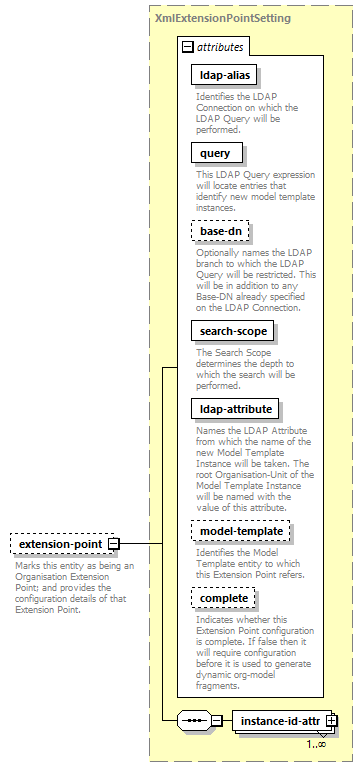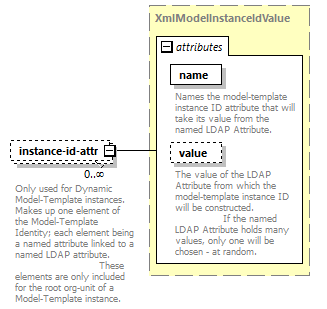| diagram |  |
||||||||||||||||||||||||||||||||||||||||||||||||||||||
| namespace | http://base.api.de.bpm.tibco.com | ||||||||||||||||||||||||||||||||||||||||||||||||||||||
| type | extension of XmlBaseOrgUnit | ||||||||||||||||||||||||||||||||||||||||||||||||||||||
| properties |
|
||||||||||||||||||||||||||||||||||||||||||||||||||||||
| children | schema-type allocation-method location-ref privilege-holding attribute push-destination extension-point instance-id-attr position org-unit | ||||||||||||||||||||||||||||||||||||||||||||||||||||||
| attributes |
|
||||||||||||||||||||||||||||||||||||||||||||||||||||||
| annotation |
|
||||||||||||||||||||||||||||||||||||||||||||||||||||||
| source | <xs:complexType name="XmlOrgUnit"> <xs:annotation> <xs:documentation>Describes an organization model organization unit and the associated entities.</xs:documentation> </xs:annotation> <xs:complexContent> <xs:extension base="XmlBaseOrgUnit"> <xs:sequence> <xs:element name="extension-point" type="XmlExtensionPointSetting" minOccurs="0" maxOccurs="1"> <xs:annotation> <xs:documentation>Marks this entity as being an Organisation Extension Point; and provides the configuration details of that Extension Point.</xs:documentation> </xs:annotation> </xs:element> <xs:element name="instance-id-attr" type="XmlModelInstanceIdValue" minOccurs="0" maxOccurs="unbounded"> <xs:annotation> <xs:documentation>Only used for Dynamic Model-Template instances. Makes up one element of the Model-Template Identity; each element being a named attribute linked to a named LDAP attribute. These elements are only included for the root org-unit of a Model-Template instance.</xs:documentation> </xs:annotation> </xs:element> <xs:element name="position" type="XmlPosition" minOccurs="0" maxOccurs="unbounded"> <xs:annotation> <xs:documentation>Describes the positions contained within this organization unit.</xs:documentation> </xs:annotation> </xs:element> <xs:element name="org-unit" type="XmlOrgUnit" minOccurs="0" maxOccurs="unbounded"> <xs:annotation> <xs:documentation>Describes the organization units contained within this organization unit (the sub-organization units). Each organization unit described may have further sub-organization units.</xs:documentation> </xs:annotation> </xs:element> </xs:sequence> <xs:attribute name="dynamic" type="xs:boolean" use="optional"> <xs:annotation> <xs:documentation>Returns true if this entity was dynamically generated as a result of an Organisational Model Extension Point; rather than part of an org-model deployment. </xs:documentation> </xs:annotation> </xs:attribute> <xs:attribute name="extension-point" type="xs:boolean" use="optional"> <xs:annotation> <xs:documentation>Only used in the org-model drill-down API. Returns true if this Org-Unit has been designated as an Extension Point. </xs:documentation> </xs:annotation> </xs:attribute> </xs:extension> </xs:complexContent> </xs:complexType> |
attribute XmlOrgUnit/@dynamic
| type | xs:boolean | ||
| properties |
|
||
| annotation |
|
||
| source | <xs:attribute name="dynamic" type="xs:boolean" use="optional"> <xs:annotation> <xs:documentation>Returns true if this entity was dynamically generated as a result of an Organisational Model Extension Point; rather than part of an org-model deployment. </xs:documentation> </xs:annotation> </xs:attribute> |
attribute XmlOrgUnit/@extension-point
| type | xs:boolean | ||
| properties |
|
||
| annotation |
|
||
| source | <xs:attribute name="extension-point" type="xs:boolean" use="optional"> <xs:annotation> <xs:documentation>Only used in the org-model drill-down API. Returns true if this Org-Unit has been designated as an Extension Point. </xs:documentation> </xs:annotation> </xs:attribute> |
element XmlOrgUnit/extension-point
| diagram |  |
||||||||||||||||||||||||||||||||||||||||||||||||||||||||||||||
| type | XmlExtensionPointSetting | ||||||||||||||||||||||||||||||||||||||||||||||||||||||||||||||
| properties |
|
||||||||||||||||||||||||||||||||||||||||||||||||||||||||||||||
| children | instance-id-attr | ||||||||||||||||||||||||||||||||||||||||||||||||||||||||||||||
| attributes |
|
||||||||||||||||||||||||||||||||||||||||||||||||||||||||||||||
| annotation |
|
||||||||||||||||||||||||||||||||||||||||||||||||||||||||||||||
| source | <xs:element name="extension-point" type="XmlExtensionPointSetting" minOccurs="0" maxOccurs="1"> <xs:annotation> <xs:documentation>Marks this entity as being an Organisation Extension Point; and provides the configuration details of that Extension Point.</xs:documentation> </xs:annotation> </xs:element> |
element XmlOrgUnit/instance-id-attr
| diagram |  |
||||||||||||||||||||||
| type | XmlModelInstanceIdValue | ||||||||||||||||||||||
| properties |
|
||||||||||||||||||||||
| attributes |
|
||||||||||||||||||||||
| annotation |
|
||||||||||||||||||||||
| source | <xs:element name="instance-id-attr" type="XmlModelInstanceIdValue" minOccurs="0" maxOccurs="unbounded"> <xs:annotation> <xs:documentation>Only used for Dynamic Model-Template instances. Makes up one element of the Model-Template Identity; each element being a named attribute linked to a named LDAP attribute. These elements are only included for the root org-unit of a Model-Template instance.</xs:documentation> </xs:annotation> </xs:element> |
element XmlOrgUnit/position
| diagram |  |
||||||||||||||||||||||||||||||||||||||||||||||||||||||||||||||||||||||
| type | XmlPosition | ||||||||||||||||||||||||||||||||||||||||||||||||||||||||||||||||||||||
| properties |
|
||||||||||||||||||||||||||||||||||||||||||||||||||||||||||||||||||||||
| children | schema-type allocation-method location-ref req-capability privilege-holding attribute push-destination candidate-query | ||||||||||||||||||||||||||||||||||||||||||||||||||||||||||||||||||||||
| attributes |
|
||||||||||||||||||||||||||||||||||||||||||||||||||||||||||||||||||||||
| annotation |
|
||||||||||||||||||||||||||||||||||||||||||||||||||||||||||||||||||||||
| source | <xs:element name="position" type="XmlPosition" minOccurs="0" maxOccurs="unbounded"> <xs:annotation> <xs:documentation>Describes the positions contained within this organization unit.</xs:documentation> </xs:annotation> </xs:element> |
element XmlOrgUnit/org-unit
| diagram |  |
||||||||||||||||||||||||||||||||||||||||||||||||||||||
| type | XmlOrgUnit | ||||||||||||||||||||||||||||||||||||||||||||||||||||||
| properties |
|
||||||||||||||||||||||||||||||||||||||||||||||||||||||
| children | schema-type allocation-method location-ref privilege-holding attribute push-destination extension-point instance-id-attr position org-unit | ||||||||||||||||||||||||||||||||||||||||||||||||||||||
| attributes |
|
||||||||||||||||||||||||||||||||||||||||||||||||||||||
| annotation |
|
||||||||||||||||||||||||||||||||||||||||||||||||||||||
| source | <xs:element name="org-unit" type="XmlOrgUnit" minOccurs="0" maxOccurs="unbounded"> <xs:annotation> <xs:documentation>Describes the organization units contained within this organization unit (the sub-organization units). Each organization unit described may have further sub-organization units.</xs:documentation> </xs:annotation> </xs:element> |
WSDL documentation generated by XMLSpy WSDL Editor http://www.altova.com/xmlspy